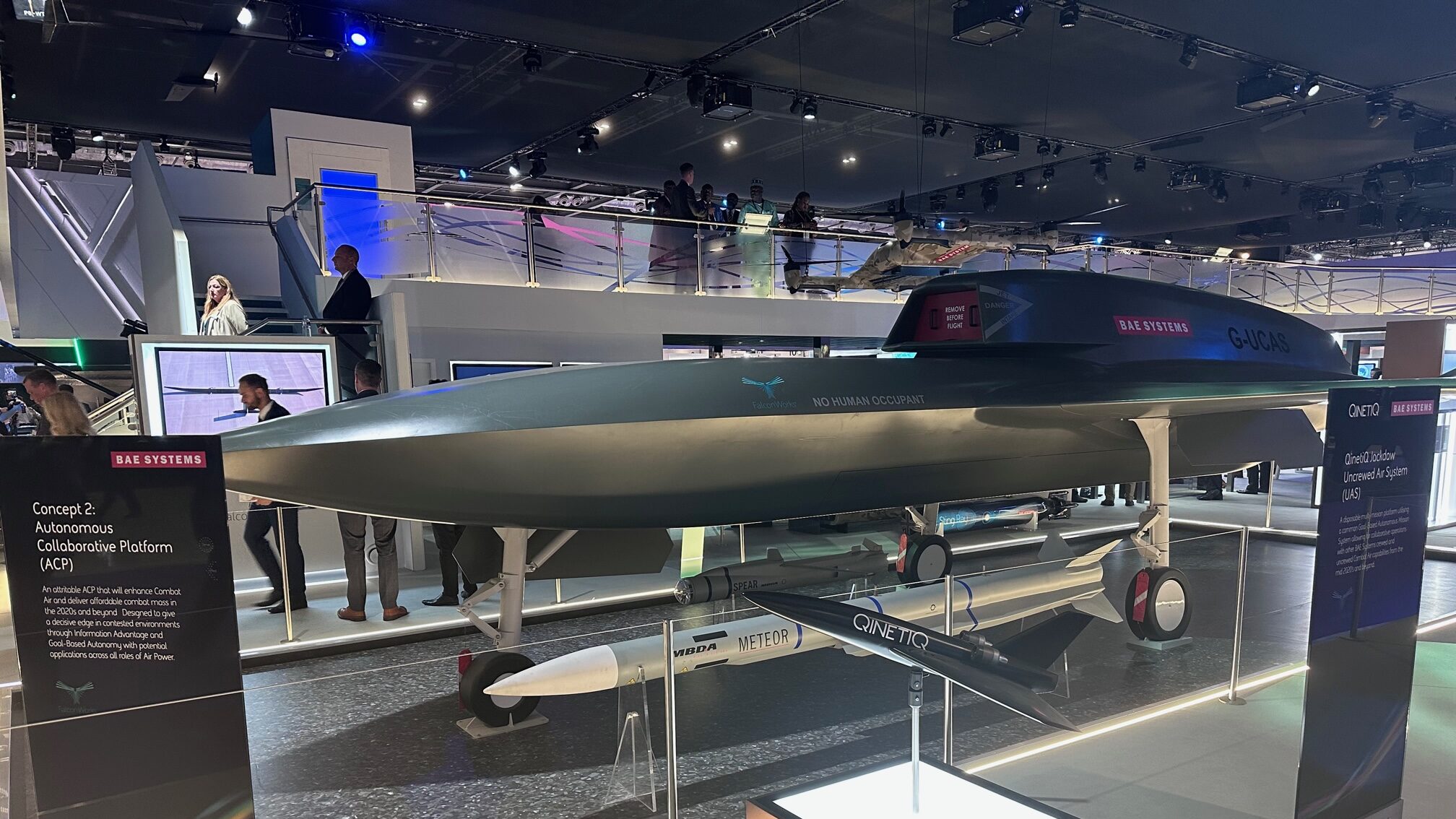
DSEI 2023 — Gazing across the pond at the US military’s ambitious, recently announced Replicator initiative to field thousands of autonomous systems at speed, a key figure from the UK’s largest defense firm said here that British industry is “absolutely” capable of doing something similar.
But to do so would require a reworking of supply chains as well as collaboration and contribution from a wide range of national UK suppliers, as opposed to one company alone, suggested David Holmes, managing director of FalconWorks, an innovation division of BAE Systems.
“Could UK [private industry] do this? Absolutely,” he said Thursday. “If we were to move into an environment that needed to produce uncrewed systems… at scale and volume, I think the novelty comes by saying, ‘We understand [the input] organizations like MRC [Manufacturing Resource Centre] or the National Composites Centre or the Manufacturing Technology Centre [would have]’… But how do you introduce them to smaller designers?”
Announced last month, the Pentagon’s Replicator project is intended to counter China’s military mass with thousands of “attritable autonomous systems” produced in just two years, although US officials have not been forthcoming about which specific systems are to be acquired and in what numbers.
The UK does not have any comparable program to Replicator, but Holmes stressed that the “route” to be able to develop something of that ambition would have to include a “different supply chain” because Britain’s industrial base is “not geared, in the main” to cope with large orders outside of contracts for “live munitions and kinetic effect delivery.”
A project like Replicator had “probably been coming for some time,” as the Ukraine war has highlighted the value of small- to medium-class autonomous systems that have “delivered battle-changing effects,” said Matt Foster, business development and strategic director for FalconWorks.
“The [different] number of uses for these types of platforms will absolutely drive scale,” said Foster. “So you’ll see in Ukraine, there’s an element of being able to suppress or overwhelm enemy air defenses through swarming technologies. So, absolutely, the scale of those types of autonomous platforms, smaller ones probably more so than the larger ones [have applicability].”
He added that while the US will always “provide significant scale” as a market for autonomous systems, a similar European requirement notionally emerges when individual country requirements are taken into consideration.
Foster stressed that the “future concepting work” for autonomous systems that FalconWorks is engaged in continues to evolve around how “Western air forces” will look to deploy them.
At DSEI on Tuesday, BAE Systems announced the signing of a framework agreement with UK supplier QinetiQ to collaborate on autonomous UAS and mission management systems.
“The framework agreement will explore the potential to collaborate and develop a family of UAS, and associated mission management systems, to support interoperability with existing and future crewed and uncrewed systems; generating operational effects and providing a concentration of combat air power,” said BAE in a statement.
In terms of specific UAV designs, at the show FalconWorks displayed an Autonomous Collaborative Platform (ACP), which company literature said could “deliver affordable combat mass in the 2020s and beyond,” while also designed to give “a decisive edge in contested environments.”
Holmes also predicted FalconWorks will make significant progress across a number of major programs by September 2025, including receiving potential orders from the UK and US for BAE’s PHASA-35 high-altitude pseudo satellites (HAPS); establishing a “production system” for the platform, reaching a rate of two units a month; and putting quadcopters into serial production for potential entry into service with the British Army and Royal Navy. In the same timeframe, “You’ll see trials with the hybrid air vehicles, in terms of simulations looking at how we can dispense multiple drones…to understand if we have the proper protocols in place around swarming,” he added.
Holmes asserted that in partnership with supplier UAVTEK, Falconworks will potentially deliver over 10,000 nano “bug” drones to “various” countries over the next two years, while BAE will work with QinetiQ to develop and flight test a new adjunct UAS dubbed Jackdaw.
FalconWorks, bearing obvious similarity to Lockheed Martin’s Skunk Works in both name and product development, was established by BAE Systems to assess emerging military aviation technologies and covers a wide spectrum of innovation from AI and autonomy, design and experimentation of autonomous collaborative aircraft and electric vehicles.
The business line was first setup in July 2023 and continues to develop partnerships with startups, academic institutions, UK Ministry of Defence agencies, foreign militaries and other non-traditional defense suppliers.
By opening up ways of working with this collection of partners, BAE Systems wants to make it easier to advance products from a “proof of concept” stage to being “production ready,” explained Holmes, adding that the overall approach is planned on giving UK armed forces an “unfair advantage” over adversaries.